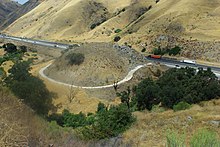Dead Man's Curve
Appearance



Dead Man's Curve is an American nickname for a curve in a road that has claimed many lives because of numerous crashes.[1][2]
Examples
[edit]- A curve on Sunset Boulevard in Los Angeles memorialized in the hit song "Dead Man's Curve" by Jan and Dean. The song's lyrics place the location of the "Dead Man's Curve" accident at the curve on westbound Sunset Boulevard just west of Doheny Drive in West Hollywood. Voice actor Mel Blanc was severely injured while driving here in 1961, and later sued the City of Los Angeles, prompting a reconstruction of the road. However, the earlier lyrics suggest the long straight starting at "Sunset and Vine" and going past "LaBrea, Schwab's (Pharmacy), and Crescent Heights" (Blvd) would suggest the first curve hit (at a high speed) would be the one at Marmont Lane, 2.4 miles (3.9 km) before Doheny. (As it is, the "drag" from Vine to Marmont is also 2.4 miles, but entirely straight.)
- A series of curves in the 21600 block of Pacific Coast Highway just east of Carbon Canyon Road in Malibu, California, which has been noted as hazardous.[3]
- A sharp turn on eastbound Interstate 70 just west of exit 259 near Morrison, Colorado that is preceded by a 7-mile (11 km) stretch of a 6.5% grade downslope, which has been the site of numerous fatal runaway truck accidents.[4]
- Between Albuquerque and Tijeras, State Road 333 (previously known as U.S. Route 66) makes a sudden curve near the I-40 overpass. This stretch of highway has earned its name because of the rocky cliffs on the south side of the highway, and frequent deer traffic contributes to its hazardousness.[5]
- A curve on Historic Route 66 at Towanda, Illinois.
- In Marquette Township in Marquette County, Michigan, Dead Man's Curve referred to a curve on County Road 492 (46°31′54″N 87°28′26″W / 46.5318°N 87.474°W), where the first state highway center line in the United States was painted when the road was part of State Highway M-15.[6][7]
- Union Square, Manhattan had a long history of traffic congestion extending back to the 1890s, when trolley lines were first installed. Two parallel trolley lines made a double curve at the southwest corner of Broadway and Fourteenth Street. In spite of traffic wardens on duty, the trolleys regularly struck pedestrians crossing the tracks in the busy shopping district around the park.[8] By 1930, the Fourteenth Street Association, a retail business association headed by its president, H. Prescott Beach, had successfully lobbied the New York transit authority to remove the above-ground rails, and move routes underground. [9]
- The nearly 90° turn on Interstate 90 near downtown Cleveland, officially called the "Innerbelt Curve", where the Cleveland Memorial Shoreway connects to the Innerbelt Freeway at a modified trumpet interchange just south of Burke Lakefront Airport (41°31′02″N 81°40′31″W / 41.5173°N 81.6754°W).[10]
- A dangerous curve on South Carolina Highway 9 about 10 miles (16 km) west of Chester, South Carolina, has been the site of several fatal crashes.[11]
- A curve on Schuylkill Expressway, a section of Interstate 76, near Conshohocken, Pennsylvania known as the Conshohocken Curve by many people, has been the site of several fatal and nonfatal crashes.[12]
See also
[edit]References
[edit]- ^ Allen, Irving Lewis (1995). The City in Slang: New York Life and Popular Speech. New York: Oxford University Press. ISBN 0-19-509265-1 – via Google Books.
A bend in any road that has a history of vehicular accidents always seems to be called Dead Man's Curve.
- ^ Algar, Selim (October 8, 2012). "Police: 4 Killed in Gruesome Long Island Accident: Driver Only Had Learner's Permit". New York Post. Retrieved August 8, 2015.
The site is so frequently the scene of horrific accidents, first responders call it 'Dead Man's Curve'.
- ^ Garcia, Karen; Childs, Jeremy; Winton, Richard (October 30, 2023). "BMW driver accused of killing 4 Pepperdine students out on $4-million bond". Los Angeles Times. Retrieved November 28, 2023.
- ^ Gathright, Alan (July 12, 2007). "Stretch of I-70 has deadly legacy". Rocky Mountain News. Archived from the original on July 14, 2007. Retrieved July 13, 2007.
- ^ "New Mexicans move to make roads more wildlife-friendly". Hcn.org. 2 August 2004. Retrieved October 5, 2014.
- ^ Kulsea, Bill; Shawver, Tom (1980). Making Michigan Move: A History of Michigan Highways and the Michigan Department of Transportation. Lansing: Michigan Department of Transportation. p. 10. OCLC 8169232. Retrieved January 18, 2021 – via Wikisource.
- ^ Federal Highway Administration (1977). America's Highways, 1776–1976: A History of the Federal-Aid Program. Washington, D.C.: US Government Printing Office. p. 127. OCLC 3280344.
- ^ "UNION SQUARE AND THE DEMISE OF 'DEAD MAN'S CURVE'". Bowery Boys. 28 July 2010. Retrieved January 15, 2017.
- ^ "The "New Woman" Revised". Publishing.cdlib.org. Retrieved February 9, 2019.
- ^ Dorwart, Laura (29 May 2018). "Why This Cleveland Roadway is Known as 'Dead Man's Curve'". Culture Trip. Retrieved 9 January 2020.
- ^ Ritter, Jana. "Recent Fatal Crash Prompts Action To Fix 'Deadman's Curve'". TruckDrivingJobs.com. Retrieved May 18, 2016.
- ^ "Hours of Delays as Crash Stops Traffic on Schuylkill Expressway". NBC10 Philadelphia. 23 June 2020. Retrieved 2021-02-18.
Further reading
[edit]- Sweeney, Jim (2023). "What's the Deal with Dead Man's Curve?". What's the Deal with Dead Man's Curve? And Other Really Good Questions About Cleveland. Gray & Company. ISBN 978-1-59851-131-4.
